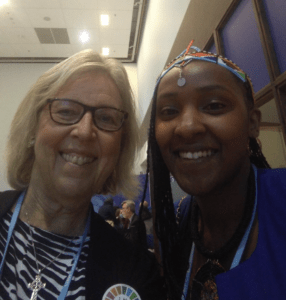Letter from COP26: Day One…Heady Speeches, Little Movement

First COP26 selfie, with Kenyan activist Elizabeth Wathuti
Elizabeth May
November 1, 2021
I never thought I would enjoy listening to UK Prime Minister Boris Johnson. But I did today. In the opening session of the COP26 Leaders’ Summit, the British PM was as clear as any leader I have ever heard on the fact we have a doomsday clock; and that we have run down that clock on climate action until we are now at “one minute to midnight.”
Similar calls for urgency were heard from leaders from around the world. United Nations Secretary General Antonio Guterres gave a hard-hitting speech:
“It’s time to say: enough. Enough of brutalizing biodiversity. Enough of killing ourselves with carbon. Enough of treating nature like a toilet. Enough of burning and drilling and mining our way deeper… We are digging our own graves.”
Prince Charles also spoke in stark terms, calling for governments to put ourselves on a “war-like footing.” He called for radical transformation, including for a circular economy. He called for trillions of dollars of climate finance for a fundamental transformation and, somewhat surprisingly, called for the private sector to act.
US President Joe Biden did the best job in speaking to the IPCC science advice. focusing not on net-zero by 2050 but on the immediate need for action before 2030. He called this the “decisive decade” when we will either have a chance of holding to 1.5 degrees or lose that chance forever. For me, his closing words “May God bless you all and may God save this planet” were striking. I have heard (maybe thousands of times) US presidents closing with “God Bless America.” The emotion with which Joe Biden said “May God save this planet” was powerful.
Of global polluters doing far too little, we had no-shows from Russia, China and Brazil. And we had Prime Minister Modi of India attend in person but commit to little. Still, it is not nothing that he has now pledged to generate half of India’s electricity from renewable energy by 2030. But net-zero by 2070 is a long way from acceptable.
I have heard (maybe thousands of times) US presidents closing with ‘God Bless America.’ The emotion with which Joe Biden said ‘May God save this planet’ was powerful.
Of the many world leaders who spoke, those from the Global South did so with the greatest authenticity. The prime minister of Barbados was one of those. PM Mia Mottley said, “For those who have eyes to see, for those who have ears to listen and for those who have a heart to feel, 1.5 is what we need to survive…”
She added that 2 degrees of heating “is a death sentence for the people of Antigua and Barbuda, for the people of the Maldives, for the people of Dominica and Fiji, for the people of Kenya and Mozambique, and yes, for the people of Samoa and Barbados….We do not want that dreaded death sentence and we have come here today to say: Try harder.”
Did Canada “try harder?” Prime Minister Justin Trudeau’s speech was strong in describing the loss of the town of Lytton, B.C. in an astonishing and rapid conflagration. But his response to our summer of climate emergency suggested calculation more than transformation.
He added no new commitments, but shared with the world some of the newer elements of Liberal promises, fresh from the 2021 campaign. He reiterated our commitment to end the export of thermal coal from Canada as he promised in the campaign, but not until 2030. Few Canadians know that US thermal coal is shipped from the Port of Vancouver because western US ports refuse to do so. We have the tools in the Canadian Environmental Protection Act to stop it immediately. A few years to provide planning time is understandable, but nine years is unconscionable.
The commitment to set caps on emissions from the oil sands was also a 2021 campaign pledge, but why only on emissions and not on production? And why send the request for a goal to a non-expert, multistakeholder panel created through the Climate Accountability Act? Why not assemble the Canadian scientists who are part of the IPCC and ask them to determine our remaining carbon budget? What we need to know is straightforward: what is our carbon budget? How fast are we exhausting it? And how fast must we act?
Of heroes here at the summit, the world’s youth are the stand-out champs. Kenyan activist Elizabeth Wathuti asked world leaders — from Boris Johnson to Prince Charles to Emanuel Macron — to be silent in memory of all those who have died this year in climate-related events. And then she asked them all to “open your hearts and then to act.”
On Tuesday, Deputy Prime Minister Chrystia Freeland arrives in Glasgow to join the PM and Environment and Climate Change Minister Steven Guilbeault for some kind of climate finance announcement. Perhaps there will be some manner of commitment that restores hope for a stronger agreement.
Meanwhile, I keep praying, “God save this planet.”
Contributing Writer Elizabeth May, MP for Saanich-Gulf Islands, is the former leader of the Green Party of Canada. She has attended COP summits from the beginning, and will be sharing impressions of COP26 from Glasgow over the next two weeks.
